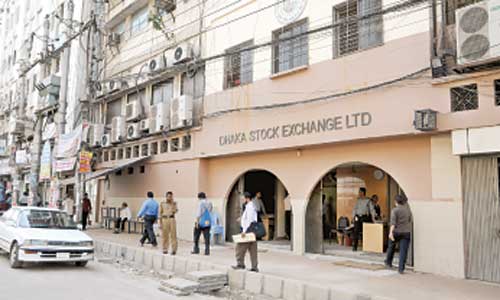Bangladesh Bank on Sunday relaxed the provision for scheduled banks’ investment in the capital market by excluding their equity investment in subsidiary companies in calculating the banks’ capital market exposure.
The BB issued a circular to the managing directors and chief executive officers of all banks saying that the banks’ equity share in their subsidiary companies (merchant banks and brokerage houses) would not be included in the banks’ exposure in the capital market with an effect from January 1 next year.
The central bank issued the circular on special power in line with the article 45 of Bank Company Act 1991.
The BB relaxed the policy to make the capital market more vibrant, according to the circular.
A BB official told New Age on Sunday that the banks were now allowed to invest maximum 25 per cent of their four heads of capital in the capital market on solo basis. The equity investment of the banks in their subsidiary companies is now also included in the 25 per cent.
The four heads of the banks’ capital are paid-up capital, retail earnings, statutory capital and share premium account.
The capital market exposure of six banks, however, crossed the limit of investment on solo basis.
But, under the new provision the banks will be able to invest the 25 per cent excluding their equity share in their subsidiary companies from the calculation, the official said.
He said that the banks would be able to provide capital to their subsidiary companies as per requirement of the banks.
The banks have so far provided capital more than Tk 5,600 crore to their subsidiary companies while their (banks) total investment in the capital market stood at around Tk 23,000 crore.
According to the bank company act, the banks are now allowed to invest maximum 50 per cent of their capital in the capital market on consolidated basis.
The BB data, however, showed that the banks’ average investment in the capital market stood at 35 per cent on consolidated basis meaning that the banks will get enough scope for increasing their market exposure.
On the other hand, the banks’ average investment in the capital market was 34 per cent on solo basis.
The central bank took the decision following intensive pressure from the capital market stakeholders.
The key index of Dhaka Stock Exchange, DSEX, had lost around 500 points from September 28 to November 11 as investors were apprehending that the market would fall further ahead of the capital market exposure adjustment deadline in July 21, 2016.
On November 4, some 20 subsidiaries of banks and non-bank financial institutions urged the Bangladesh Securities and Exchange Commission to get Bangladesh Bank’s support for saving the capital market from institutional share sales worth around Tk 6,000 crore –Tk 7,000 crore by extending the banks’ capital market exposure deadline till December 31, 2020.
The Dhaka Stock Exchange also proposed the same in a letter to the commission.
Due to the prolonged market fall, commerce minister Tofail Ahmed at the inaugural ceremony of the DSE Brokers Association of Bangladesh on October 31 called on the authorities concerned to extend the deadline by another two years for adjusting the banks’ capital market exposure.
Following intensive pressure, finance minister AMA Muhith on November 15 said the government would extend the July 2016 deadline for banks for reducing their stock market exposure by another two years.
Muhith said that the government would amend the act and he would recommend extending the deadline by another two years as the banks would not be able to adjust their exposure within the existing deadline. ‘The capital market is being affected by the provision [of the existing deadline] of the law.
We have decided to amend it as it has created panic among investors in the present crisis [stocks’ bear run],’ he said.
After the Muhith’s statement, the DSEX recovered around 220 points till December 3.
The BB issued a circular to the managing directors and chief executive officers of all banks saying that the banks’ equity share in their subsidiary companies (merchant banks and brokerage houses) would not be included in the banks’ exposure in the capital market with an effect from January 1 next year.
The central bank issued the circular on special power in line with the article 45 of Bank Company Act 1991.
The BB relaxed the policy to make the capital market more vibrant, according to the circular.
A BB official told New Age on Sunday that the banks were now allowed to invest maximum 25 per cent of their four heads of capital in the capital market on solo basis. The equity investment of the banks in their subsidiary companies is now also included in the 25 per cent.
The four heads of the banks’ capital are paid-up capital, retail earnings, statutory capital and share premium account.
The capital market exposure of six banks, however, crossed the limit of investment on solo basis.
But, under the new provision the banks will be able to invest the 25 per cent excluding their equity share in their subsidiary companies from the calculation, the official said.
He said that the banks would be able to provide capital to their subsidiary companies as per requirement of the banks.
The banks have so far provided capital more than Tk 5,600 crore to their subsidiary companies while their (banks) total investment in the capital market stood at around Tk 23,000 crore.
According to the bank company act, the banks are now allowed to invest maximum 50 per cent of their capital in the capital market on consolidated basis.
The BB data, however, showed that the banks’ average investment in the capital market stood at 35 per cent on consolidated basis meaning that the banks will get enough scope for increasing their market exposure.
On the other hand, the banks’ average investment in the capital market was 34 per cent on solo basis.
The central bank took the decision following intensive pressure from the capital market stakeholders.
The key index of Dhaka Stock Exchange, DSEX, had lost around 500 points from September 28 to November 11 as investors were apprehending that the market would fall further ahead of the capital market exposure adjustment deadline in July 21, 2016.
On November 4, some 20 subsidiaries of banks and non-bank financial institutions urged the Bangladesh Securities and Exchange Commission to get Bangladesh Bank’s support for saving the capital market from institutional share sales worth around Tk 6,000 crore –Tk 7,000 crore by extending the banks’ capital market exposure deadline till December 31, 2020.
The Dhaka Stock Exchange also proposed the same in a letter to the commission.
Due to the prolonged market fall, commerce minister Tofail Ahmed at the inaugural ceremony of the DSE Brokers Association of Bangladesh on October 31 called on the authorities concerned to extend the deadline by another two years for adjusting the banks’ capital market exposure.
Following intensive pressure, finance minister AMA Muhith on November 15 said the government would extend the July 2016 deadline for banks for reducing their stock market exposure by another two years.
Muhith said that the government would amend the act and he would recommend extending the deadline by another two years as the banks would not be able to adjust their exposure within the existing deadline. ‘The capital market is being affected by the provision [of the existing deadline] of the law.
We have decided to amend it as it has created panic among investors in the present crisis [stocks’ bear run],’ he said.
After the Muhith’s statement, the DSEX recovered around 220 points till December 3.
Source: New Age










